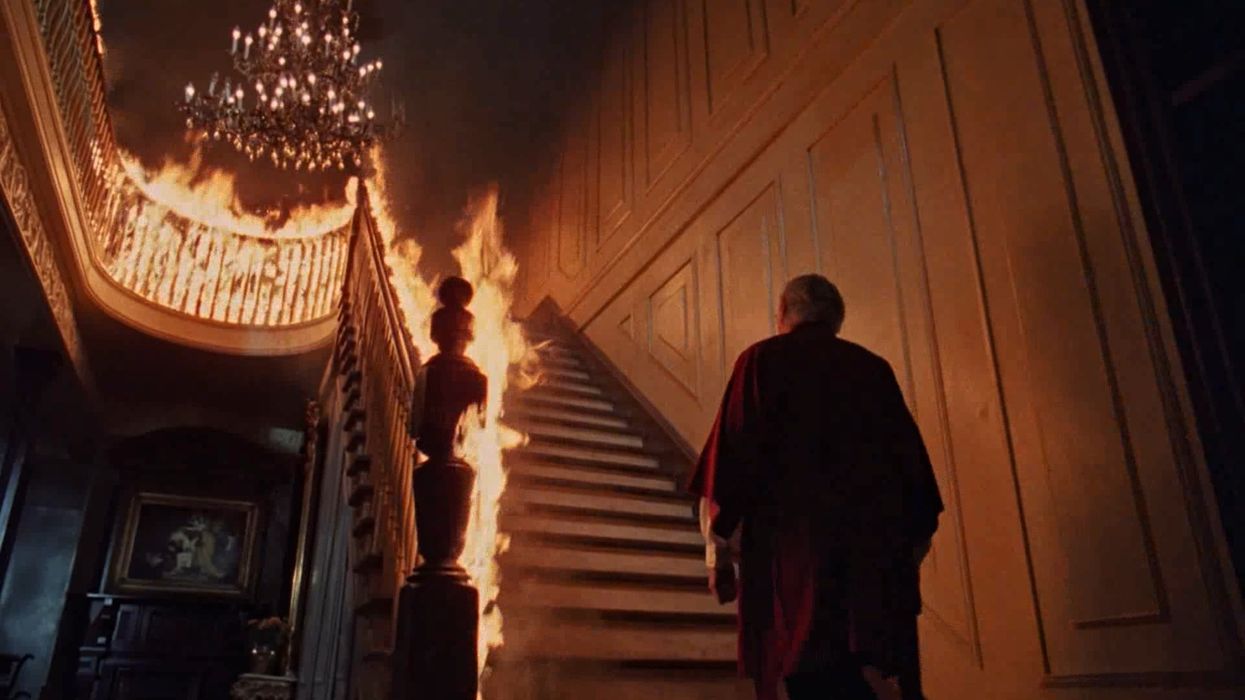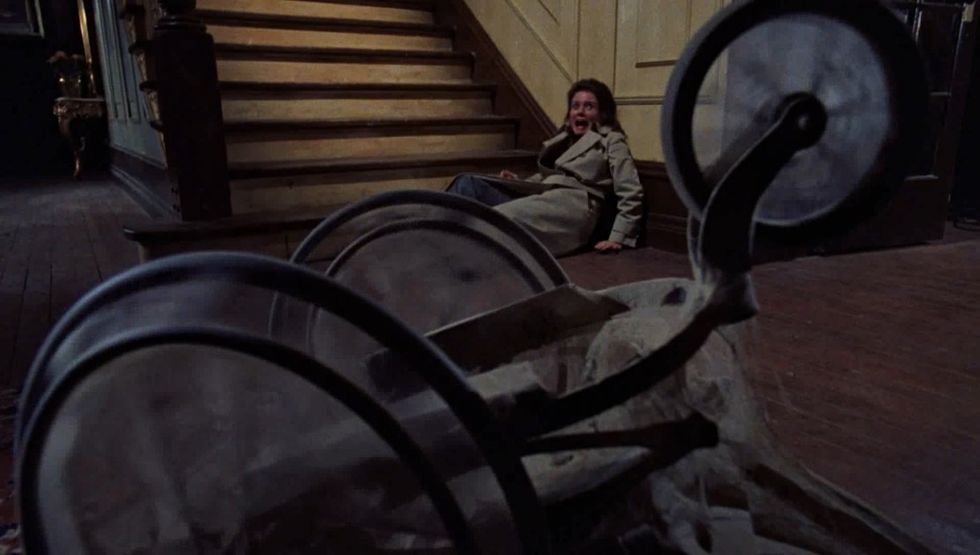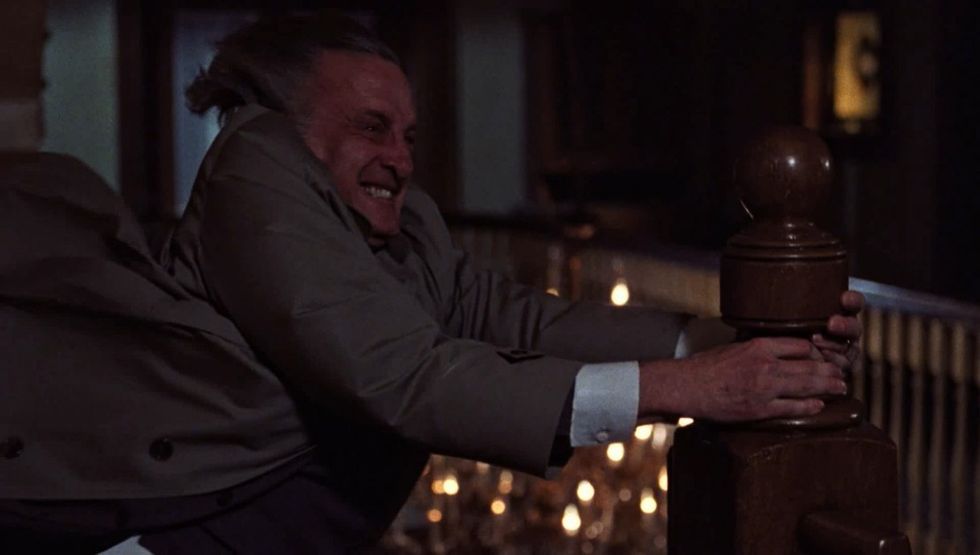'The First Shot is Always the Most Important': 'Changeling' Director Peter Medak on Trusting Your Instincts

The 80-year-old Hungarian filmmaker Peter Medak has worked with Peter Sellers, Gary Oldman, Alan Bates, Roy Scheider, Harvey Keitel, Patty Duke, William Shatner, Peter Gabriel, Glenda Jackson, Tony Curtis, and George C. Scott. He has directed episodes of The Wire and Hannibal. He has made both cult and critically acclaimed movies spanning over six decades. And yet I doubt there's anyone who'd raise a fuss if you admitted to never having heard of him before. Medak has consistently made entertaining and beguiling works of cinematic art, never becoming famous for the work he did so quietly behind the camera.
His horror movie, The Changeling, is likely the best known of his works, a ghost story about a music scholar played by George C. Scott in one of his most reserved late-career performances. As The Changeling prepares to make the upgrade to Blu-Ray on August 7th (thanks to Severin Films) and a 35mm print makes the repertory theatres rounds, No Film School spoke with Medak about his career as a maker of cult curios that stand the test of time.
No Film School: When I heard they were finally cleaning up The Changeling, it came to me as a huge relief. The version that's been available doesn't do justice to the rich textures of the film. How do you feel about the new transfer?
Peter Medak: It's very nice, you know? Of course one doesn't look at it that often, once every year there's a screening on film on which is always looked wonderful. Sometimes I forget that it's on the DVD. It's great to know it's being done properly, particularly because my original producer, Joel Michaels, is trying to remake the film. A version for today, you know? It's very nice that before that happens, there's a proper cut of that for the future, for people to compare the two films before the new movie gets made.
NFS: The Changeling has proven hugely influential on modern American horror. It's about a guy who discovers a ghostly presence and conducts a thorough DIY investigation, which today you find it in the likes of The Conjuring, Hereditary, Sinister....
Medak: It's a classical ghost story about some hidden things which have happened in the past and are indirectly discovered. That's the catalyst of the film. He (George C. Scott's character) thinks it's about his daughter, but it isn't. It's always full of surprises.
"I mean, George C. Scott was a genius actor and maybe he vibrated the cigarette ash at absolutely the perfect time. It's those little accidental moments that make movies so real!'"
NFS: The movie worked best for me not as horror film but as a study of a guy trying to put on a strong face while recovering from the most horrific moment of his life; it's a study of an ordinary guy thrust into extraordinary circumstances. There's even levity in there, like the scene in the lecture hall, which doesn't play like a comedic scene but a scene where a funny thing happens to a guy who isn't expecting it. It's crowd work, basically, and he's a natural. I think my favorite scene of Scott is him smoking a cigarette listening to the tape of the seance.
Medak: Well, actually that scene in the seance when George is smoking that cigarette when he discovers the voice he unknowingly recorded, the old-fashioned spool tape recorder, was for me one of the most memorable moments in the film. Because George is smoking the cigarette and the ash is sort of slightly bent on it and when he hears the word "Joseph" (and goes back and verifies it by listening to it three times), the ash actually just accidentally dropped. It's just one of the most fantastic moments in the film.
I always love to see things like that. I mean, George was a genius actor and maybe he vibrated the cigarette ash at absolutely the perfect time. It's those little accidental moments that make movies so real! They don't feel artificially done. George's performance is truly fantastic. That's one of the reasons I didn't want to get involved in the remake of the film. "Where do I find a George C. Scott today?" I've done the film once, what am I gonna do the second time around?

NFS: That'd be a peculiar sort of deja-vu.
Medak: Well, it's always fun to make a movie, for whatever reason. When one denies that, you deny yourself the joy of actually making movies. Because the movie was so perfect in a way for me, there's just no point trying to have it again. I'll just keep trying to find alternative plots. I'd much rather live with the old film.
To my amazement, I mean, we made the movie In 1980, every year there's some screening of the film on 35mm film. You have to go and talk and all that and the film has that life, that power that goes on after all those years. If you're lucky enough to get it made and it has a very good lasting power, that makes me very happy.
NFS: You've made quite a few films people still talk about. One of my favorite films ever is your movie, The Ruling Class.
Medak: See that! It still plays on. There have been talks of remaking that and it was a play originally, still being performed on stage every 10 years or so.
"You have to go and talk and all that and the film has that life, that power that goes on after all those years."
NFS: Between George C. Scott, Peter Sellers, Peter O'Toole and Richard Harris, you've worked with every third screen giant from the last half-century.
Medak: I was very fortunate to work with those actors, to know them, to have known each other. It was always a relationship with love forever, dead or alive. It's a wonderful thing because it makes one feel incredibly rich in a way. That's the real bonus to working with some great actors, they're just magical. George was one of them. Peter O' Toole was one of them. Gary Oldman, Alan Bates, Roy Scheider, an endless list of people who were exceptionally brilliant and I had a great honor working with them.
To get inside of them, to get inside of each other, is the best way to direct actors. You don't want to bombard them with what you want but to unconsciously maneuver them so that it becomes a communion. You need less "Stand over there, sit over here," as those are the ordinary things. It's much more important to have unspoken communication between a director and a wonderful actor and to respond to each other's sensitivities. Mr. Scott was a phenomenal powerhouse and a wonderful, wonderful person, and very scary because he was very big and overpowering! It didn't worry me because I love actors so much and they know it.
It's very important to establish that trust early on. It doesn't mean it will allow the actors to do certain things that don't fit into the movie, but it really is an incredible relationship between a director and an actor…if it works.
NFS: You've made projects in a number of different tonal registers. The Changeling and Species 2, for instance, don't have much in common as viewing experiences. Is it more fun to do a more sober film like The Changeling or a more maximalist film like Species 2?
Medak: What do you mean by maximalist?
NFS: In this case, making a movie not about implication like The Changeling, but about the spectacle of monsters running amok.
Medak: To me, it's terribly important what I, or any director, does with a camera. That's what you express everything with. I have a certain visual take on things, particularly when you want to frighten someone. It's the same kind of element when something horrible is about to happen in Species 2 or you think you're seeing something move a curtain slightly but you don't know what's moving it. It's just a visual conception of how you portray horror or fear. It's not calculated whatsoever. It's completely instinctual.
When I read the script and suddenly see it in a certain way, the first shot is always the most important. Unconsciously, that very first thing will come back and those are the things that make movies work properly. It's an instinct, an intuition one has because it will always say, "What does it take to be a director?" You have to listen inside your heart or your soul and something will tell you what to do. The most important thing is your instinct, that unknown thing inside of you. When you write a great sentence in an article or something, you just do it, it just pops out, doesn't it? All of the great composers were waiting to get connected with God and the days they couldn't, they couldn't write. Whether you believe in God or not, something else tells you what to do. It's very important to treasure that.

NFS: Can you talk about the difference between your working methods today compared to when you were making The Changeling or The Ruling Class?
Medak: It's gotten much more difficult to make movies. The only good thing is that there are 200 outlets instead of just four or five studios. We are traveling in such a different world. As you get older, they have an objection to your age, i.e. "Oh, he's too old to do this." What they don't realize is that the older you get, the more you know, because you've done it! It becomes easier. It's a completely different business, unfortunately. Things were much easier in the past because you were dealing with one person behind a desk at a studio. Now you're dealing with committees and agents and all kinds of stuff. 90% of it has to do with money, i.e. "How much money can this make?"
There's a kind of judgment or calculation. Most of the time they're wrong, none of the studios ever knows what makes a film brilliant. You can just try to make it the best possible way you can and then put up to see if it succeeds or not. If people really knew what worked or not, they'd only make $400,000,000 blockbuster movies. Ever so often, the most foolproof project completely fails, and then the smallest film comes from left field, sneaking past everyone's watchful eye, and succeeds through the roof. It happens every year! At the Academy Awards, there are always three or four movies that make you ask, "How did this one get by? How was it possible to get this one made?"
You have to keep trying. You can never give up. You have to keep pushing for the film. make what you believe in and see if it succeeds.
'The Changeling' will be available on Blu-ray August 7th from Severin Films.
















